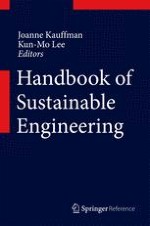2013 | OriginalPaper | Buchkapitel
2. Blueprints for Teaching Ecodesign and Sustainability to University Students
verfasst von : Professor Charles Pezeshki, Dr. Jitesh H. Panchal, Dr. Gaurav Ameta
Erschienen in: Handbook of Sustainable Engineering
Verlag: Springer Netherlands
Aktivieren Sie unsere intelligente Suche, um passende Fachinhalte oder Patente zu finden.
Wählen Sie Textabschnitte aus um mit Künstlicher Intelligenz passenden Patente zu finden. powered by
Markieren Sie Textabschnitte, um KI-gestützt weitere passende Inhalte zu finden. powered by
